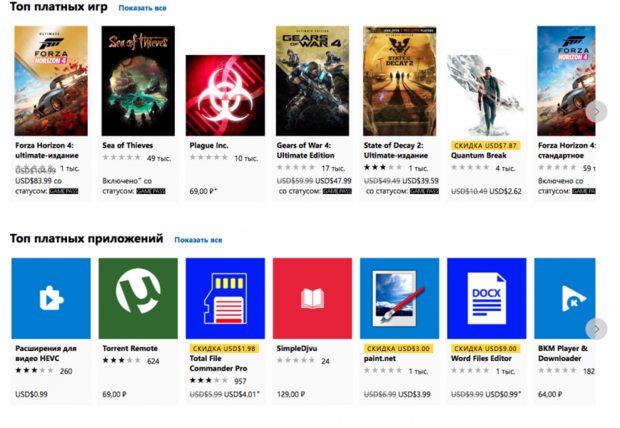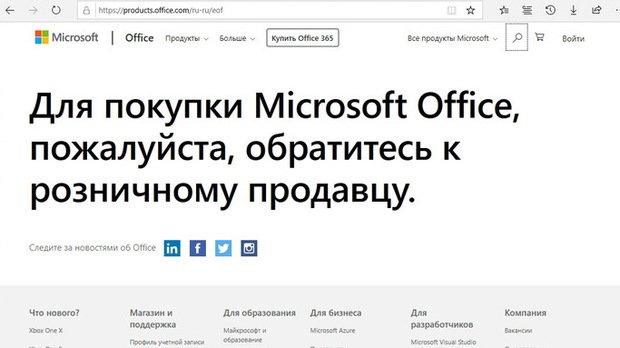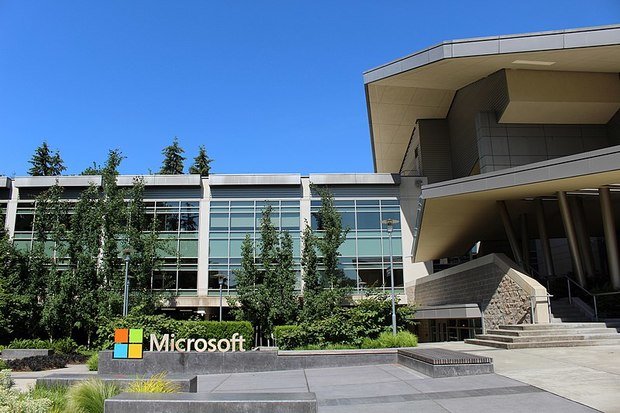Bill Gates to say bye-bye to Russia?
Four signs that Microsoft is leaving Russia, and two reasons why it won’t want to do it
The departure of Microsoft from the Russian market is actively discussed in the media and on portals. To find out if the rumours are true, Realnoe Vremya's correspondent turned to Microsoft itself and also tried to buy software on its page and get tech support in the Russian language. Our new material tells how that turned out.
Four signs Microsoft's leaving Russia
''Microsoft's leaving Russia'', news with this headline appeared on several federal portals at once. Sanctions that came into force on 22 November were called as a reason. But the company itself doesn't officially confirm the information, though formulations are vague. ''We are committed to our users in Russia and continue working in this country,'' Microsoft's external press service in Russia answered to Realnoe Vremya's request.
So what triggered the talks that the company might leave the Russian market? First of all, curious users found hints in actions of Microsoft itself.

1. Prices converted into dollars
To start with, the company has converted prices for its products and subscriptions for services in Microsoft Store into dollars.
''In Microsoft Store, we still try to provide an exceptional user experience around the world. Due to the development of business practices of Microsoft Store, all prices will be in USD. Users in Russia can also visit our retail partners to purchase Microsoft products in rubles. This decision was dictated by the necessity to develop the business approach. After technical and operational analysis, Microsoft made a decision to refocus sales on retail partners,'' Microsoft's external press service in Russia explained to Realnoe Vremya.
However, some experts think this is quite a logical occurrence.
''I think it's a correct step. The ruble is the currency one should focus on. Operating systems sold as programme products are a very small market. I'm not sure that a big number of users in Russia purchase the official Windows. I'm telling the truth. This is why the sale of boxed products isn't the principal market in Russia Microsoft is afraid of losing, this is why the prices have been in dollars,'' thinks Director of Tor IT company Lenar Mukhametzyanov.
2. Sales have been given to distributors
Users discontentedly note that Microsoft has stopped selling Microsoft Office on its page since 1 October. Every attempt to buy the product on the page ends with a recommendation to go to a retail seller. In this case, it's said sale has been entrusted to distributors – M.Video, Eldorado, Citilink and DNS.
M.Video's press service said they knew nothing about Microsoft's plans to exit Russia. At the same time, the company sees growth in sales of Microsoft products.

M.Video and Eldorado sold and keep selling software of both Microsoft and Hancom, a Korean OS developer. Retail sales of units of licensed office suites in Russia have increased by about a third in the last year, notebooks and computers have added some 13%. The positive indicator is linked with a wider assortment of quality products in different price segments and, consequently, users' refusal of piratical content in favour of licensed solutions. Sales of units of office suites in M.Video and Eldorado have grown by 80%. A two-digit rise is observed in both the upper price segment – demand for Microsoft Office has gone up by 40% – and the lower – to 3,000 rubles.
According to our estimates, the group accounts for over 50% of retail sales of office OS,'' Valeria Andreyeva, director of PR Department in M.Video-Eldorado group.
Some resources write that the sale of software will also be cancelled. We tried to purchase Windows10 on the official page of Microsoft. The attempt turned out quite successful – we're offered to add the product to basket. By the way, prices were in rubles: Windows10 costs about 9,500 rubles. The page also contains devices (notebooks, tablets) that already have the software. Having clicked on a specific model, one can see which of the distributors have it on sale.
3. Hotline in Russian is cancelled
Information about the cancellation of tech support in the Russian language became another proof that the company will exit Russia. We called the Russian Microsoft Store Sales and Client Support and the Russian tech support: in both cases, we were answered in Russian.
In Lenar Mukhametzyanov's opinion, Microsoft can start offering support only in the English language using its own product for it.
''They have an online translator in Skype that translates quite well, including speech. They created the product, why not use this technology?'' he says and supposes that as time goes by the company might refuse technical support not only in Russian but also in other languages.

4. Personnel reduction
In answer to the question if Microsoft was offering its Russian employees to move to work in other countries, the company's press service hasn't said anything. Yefim Klimov considers that Microsoft could really have a big staff in Russia, which turned out unclaimed in competition with Russian producers.
''I even think it was too expensive costs during those fat years, I will dare to say, when 99% of the market was occupied by foreign vendors, and they were present here as a monopoly and dictated their prices, freely received surplus incomes and could afford too high costs. The market puts everything in order, in addition, there is competition in the domestic market,'' Yefim Klimov, director general of Etton, says.
''The situation here is that people will live and survive without it''
Nobody can say for sure if Microsoft will remain in Russia or not. Editor-in-Chief of TelecomDaily Denis Kuskov allows that the company could leave the Russian market. Both sanctions and growing competition provided by Russian developers can be a reason.
 ''We understand we're living in confrontation – economic and political. Foreign companies operating in Russia – Cisco, Intel, Microsoft – find it tough to work from a perspective of changes in their headquarters, which can't do something due to sanctions. It's tough to work because they have some import substitution, localisation of both OS and devices. Again, it's no secret that the number of employees and financing of companies in Russia are suddenly reducing. This is why everything is fine, and it's quite possible. We all got used to the Office, some consoles that Microsoft makes, but other companies produce a part of OS. For this reason, the situation here is that people will live and survive without it,'' he says.
''We understand we're living in confrontation – economic and political. Foreign companies operating in Russia – Cisco, Intel, Microsoft – find it tough to work from a perspective of changes in their headquarters, which can't do something due to sanctions. It's tough to work because they have some import substitution, localisation of both OS and devices. Again, it's no secret that the number of employees and financing of companies in Russia are suddenly reducing. This is why everything is fine, and it's quite possible. We all got used to the Office, some consoles that Microsoft makes, but other companies produce a part of OS. For this reason, the situation here is that people will live and survive without it,'' he says.
Here we'd like to mention if there were any analogues to Microsoft products, the same Windows and Office that could be used in Russia if Microsoft ceases its operations and stops supporting products in the Russian language. The roster of Russian developments is available on the page of the Ministry of Digital Development, Communications and Mass Media. My Office can be called as an alternative to Microsoft Office.
Other office applications from the roster are likely to suit narrow specialists. If inserting ''operating systems'' in the roster's search, Linux, Os (made by Rostec) come first. The other OS won't suit ordinary users again. However, Director of Tor IT company Lenar Mukhametzyanov notes that Linux develops well, it releases stable and correct products. But it's at least unusual for an ordinary Russian user.
'Microsoft has its hands tied'
However, many experts consider we shouldn't worry beforehand, and Microsoft will unlikely lose the money it earns in Russia. Founder of Fix Group of Companies Dmitry Yeremeyev thinks the company will, first of all, aim to make a profit.
''I'm not aware of the situation. But, in my opinion, it's always a matter of the market. From this perspective, the Russian market is big enough for Microsoft, and the demand for products is high. Another question is what constructions will be used to work with this market, that's to say, it will be either a representative office in Russia or they will work without an office. Nevertheless, I think the company will work with Russia's market.''
Director General of Etton Yefim Klimov supposes that Microsoft won't stop supporting its products in the Russian language.
 ''It's a huge Russian-speaking area, it's Russia and CIS countries where software in the Russian language is used, and no sane company will leave such a big segment without tech support and accompaniment,'' he says.
''It's a huge Russian-speaking area, it's Russia and CIS countries where software in the Russian language is used, and no sane company will leave such a big segment without tech support and accompaniment,'' he says.
Lenar Mukhametzyanov thinks Microsoft has its hands tied, and it can't make a decision to exit the Russian market overnight as much as it wanted. The case is that, according to him, the majority of licensed operating systems made in Russia are anyway products provided together with hardware, that's to say, with notebooks, tablets. As a rule, software is installed on them before sale.
''If Microsoft stops supporting the Russian interface and Russian users in its systems, it will hit its partners who purchase their products on a large scale. In this respect, Microsoft has its hands tied for a simple reason: no notebook manufacturer wants to lose such a market as Russia,'' Mukhametzyanov says.